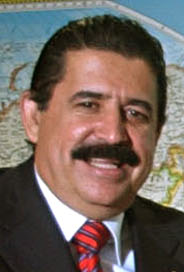
The text, distributed to reporters, was a counter-proposal to a plan floated by Costa Rican President Oscar Arias that called for Zelaya to return to Honduras within a week as president, leading a "reconciliation" government into early elections.
Micheletti's representatives said they accepted most of that plan, but not the key provision for Zelaya to retake power.
Zelaya, who was thrown out of the country by the army on June 28, can return "with the necessary guarantees so that he can exercise his rights before the competent jurisdictions of the judicial power," their text read.
In the Honduran capital Tegucigalpa, the deputy foreign minister of the new regime, Martha Lorena Alvarado, said Sunday: "Mister Zelaya can return, but only to be brought before the courts."
Honduras's new regime has leveled 18 charges against Zelaya, including "high treason." It has previously threatened to arrest him if he returns.
Zelaya has repeatedly insisted he would only accept a deal that saw him restored as president.
Neither he nor Micheletti were present in Costa Rica for the talks, with both dispatching their representatives to the discussions instead.
Each man has declared himself the only legitimate president of Honduras.
Zelaya tried to fly back into Honduras on July 5 on a plane borrowed from his strongest ally, Venezuelan President Hugo Chavez, but had to abort the landing when Honduran military vehicles parked on the runway.
He has insisted he would try again, possibly by land. Rumors suggested he might try to cross the border from Nicaragua, where he has been based since his forced exile.
His supporters in Honduras, meanwhile, have been staging daily protests demanding he be allowed to retake his position as president.
The demonstrations, which have blocked roads around the capital Tegucigalpa, have been met by a nightly curfew.
Union leaders and others backing Zelaya held a meeting Sunday to determine their next moves following the faltering talks.
"I don't think there's going to be any agreement, because the positions are so antagonistic," one of them, lawyer Cristobal Faillos, told AFP.
"The dialogue is really a lie. It's not going to lead to anything," another, retired lawyer Jose Martinez Jiron, added.
Many of Honduras's lawmakers, judges and military leaders believe Zelaya triggered the crisis by organizing a June 28 referendum without congressional approval on whether to change the constitution.
They fear the elected wealthy rancher, who swerved sharply left after taking office in 2006, was aiming to lift the one-term cap on presidents to prolong his mandate indefinitely, following Chavez's suit.
The ouster of Zelaya, though, has sparked alarm in Washington and other capitals.
There was concern that the undemocratic power shift, coupled with increasingly authoritarian governments in Venezuela, Bolivia and Ecuador, could herald a new era of coups in Latin America after a period of relative stability.
The United States and the Organization of American States have condemned Zelaya's forced exit and called for his reinstatement.
US military aid to Honduras's interim authorities has also been frozen, while the US State Department has warned Zelaya against rash moves that might jeopardize the Costa Rica talks.
--------------------------------------------------------------------------------------------------------------------
Micheletti's representatives said they accepted most of that plan, but not the key provision for Zelaya to retake power.
Zelaya, who was thrown out of the country by the army on June 28, can return "with the necessary guarantees so that he can exercise his rights before the competent jurisdictions of the judicial power," their text read.
In the Honduran capital Tegucigalpa, the deputy foreign minister of the new regime, Martha Lorena Alvarado, said Sunday: "Mister Zelaya can return, but only to be brought before the courts."
Honduras's new regime has leveled 18 charges against Zelaya, including "high treason." It has previously threatened to arrest him if he returns.
Zelaya has repeatedly insisted he would only accept a deal that saw him restored as president.
Neither he nor Micheletti were present in Costa Rica for the talks, with both dispatching their representatives to the discussions instead.
Each man has declared himself the only legitimate president of Honduras.
Zelaya tried to fly back into Honduras on July 5 on a plane borrowed from his strongest ally, Venezuelan President Hugo Chavez, but had to abort the landing when Honduran military vehicles parked on the runway.
He has insisted he would try again, possibly by land. Rumors suggested he might try to cross the border from Nicaragua, where he has been based since his forced exile.
His supporters in Honduras, meanwhile, have been staging daily protests demanding he be allowed to retake his position as president.
The demonstrations, which have blocked roads around the capital Tegucigalpa, have been met by a nightly curfew.
Union leaders and others backing Zelaya held a meeting Sunday to determine their next moves following the faltering talks.
"I don't think there's going to be any agreement, because the positions are so antagonistic," one of them, lawyer Cristobal Faillos, told AFP.
"The dialogue is really a lie. It's not going to lead to anything," another, retired lawyer Jose Martinez Jiron, added.
Many of Honduras's lawmakers, judges and military leaders believe Zelaya triggered the crisis by organizing a June 28 referendum without congressional approval on whether to change the constitution.
They fear the elected wealthy rancher, who swerved sharply left after taking office in 2006, was aiming to lift the one-term cap on presidents to prolong his mandate indefinitely, following Chavez's suit.
The ouster of Zelaya, though, has sparked alarm in Washington and other capitals.
There was concern that the undemocratic power shift, coupled with increasingly authoritarian governments in Venezuela, Bolivia and Ecuador, could herald a new era of coups in Latin America after a period of relative stability.
The United States and the Organization of American States have condemned Zelaya's forced exit and called for his reinstatement.
US military aid to Honduras's interim authorities has also been frozen, while the US State Department has warned Zelaya against rash moves that might jeopardize the Costa Rica talks.
--------------------------------------------------------------------------------------------------------------------









 Home
Home Politics
Politics









